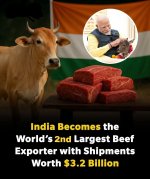India, the land of diverse cultures, deep-rooted traditions, and spiritual values, is now also the second-largest exporter of beef in the world. Yes, you read that right. While the idea of "Gau Raksha" (cow protection) is often glorified in political speeches and religious narratives, the economic reality paints a starkly different picture. This contradiction becomes even more questionable when the same political forces advocating for a Hindu Rashtra continue to benefit from an industry that directly conflicts with their public promises.
The Numbers Don't Lie
According to international trade data, India has consistently ranked among the top beef-exporting countries in the world. While the technical term used is "buffalo meat" (to differentiate from cow meat), the world market sees it as beef. Millions of tonnes of beef are exported from India annually, bringing in billions of dollars in revenue.
So here lies the paradox: On one hand, cow slaughter is banned in several states and vigilante groups commit violence in the name of cow protection. On the other hand, the government not only permits beef export but also supports it economically through policies and infrastructure.
The Double Standards
The ruling political party, which openly promotes the idea of a Hindu Rashtra, is seen as the protector of Hindu values and traditions. Yet, it is under their governance that India thrives as a beef-exporting giant. This double standard isn't just ironic — it is dangerous. It misleads the public, especially those who are emotionally or religiously invested in these issues.
During elections, innocent and uneducated citizens are emotionally manipulated using the sentiments of religion, nationalism, and tradition. Leaders speak of protecting cows and upholding dharma, while behind the scenes, the export industry continues to flourish. Is this not a direct betrayal of those very voters who placed their faith in such promises?
A Mockery of the Constitution
India is a secular democratic republic — this is clearly stated in the Constitution. The idea of a Hindu Rashtra, in itself, goes against the constitutional spirit of inclusivity and equality. When political parties promise such transformations, they are not only playing with religious emotions but also challenging the very foundation of our nation.
Using religion to gain votes and then acting in contradiction to those promises is a clear exploitation of democratic values. The sacred vote, which should represent the hopes and needs of the people, is being reduced to a tool of manipulation.
Why This Needs To Be Questioned
We, as citizens — especially the youth — need to start asking uncomfortable questions. We must look beyond emotional speeches and question the facts. Is the narrative we’re being sold genuine? Or is it a mask hiding economic interests, vote-bank politics, and power games?
In a country where expressing your opinion can often bring backlash, it's more important than ever to write, speak, and think fearlessly. Because silence in the face of hypocrisy only makes the lie stronger.
 Final Thought:
Final Thought:
Politics should not be about selling dreams and delivering contradictions. It should be about truth, transparency, and trust. When a nation’s values are traded for votes, the damage runs deeper than numbers — it erodes the soul of democracy.
The Numbers Don't Lie
According to international trade data, India has consistently ranked among the top beef-exporting countries in the world. While the technical term used is "buffalo meat" (to differentiate from cow meat), the world market sees it as beef. Millions of tonnes of beef are exported from India annually, bringing in billions of dollars in revenue.
So here lies the paradox: On one hand, cow slaughter is banned in several states and vigilante groups commit violence in the name of cow protection. On the other hand, the government not only permits beef export but also supports it economically through policies and infrastructure.
The Double Standards
The ruling political party, which openly promotes the idea of a Hindu Rashtra, is seen as the protector of Hindu values and traditions. Yet, it is under their governance that India thrives as a beef-exporting giant. This double standard isn't just ironic — it is dangerous. It misleads the public, especially those who are emotionally or religiously invested in these issues.
During elections, innocent and uneducated citizens are emotionally manipulated using the sentiments of religion, nationalism, and tradition. Leaders speak of protecting cows and upholding dharma, while behind the scenes, the export industry continues to flourish. Is this not a direct betrayal of those very voters who placed their faith in such promises?
A Mockery of the Constitution
India is a secular democratic republic — this is clearly stated in the Constitution. The idea of a Hindu Rashtra, in itself, goes against the constitutional spirit of inclusivity and equality. When political parties promise such transformations, they are not only playing with religious emotions but also challenging the very foundation of our nation.
Using religion to gain votes and then acting in contradiction to those promises is a clear exploitation of democratic values. The sacred vote, which should represent the hopes and needs of the people, is being reduced to a tool of manipulation.
Why This Needs To Be Questioned
We, as citizens — especially the youth — need to start asking uncomfortable questions. We must look beyond emotional speeches and question the facts. Is the narrative we’re being sold genuine? Or is it a mask hiding economic interests, vote-bank politics, and power games?
In a country where expressing your opinion can often bring backlash, it's more important than ever to write, speak, and think fearlessly. Because silence in the face of hypocrisy only makes the lie stronger.
Politics should not be about selling dreams and delivering contradictions. It should be about truth, transparency, and trust. When a nation’s values are traded for votes, the damage runs deeper than numbers — it erodes the soul of democracy.

